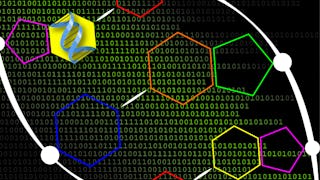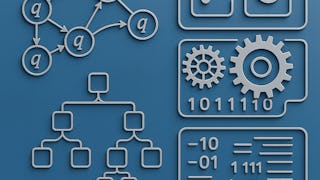- Browse
- Cognitive Science
Cognitive Science Courses Online
Understand cognitive science principles for studying the mind and behavior. Learn about perception, memory, learning, and decision-making processes.
Explore the Cognitive Science Course Catalog
 Status: Free TrialFree Trial
Status: Free TrialFree TrialSkills you'll gain: Data Ethics, Data Analysis, Analytics, Data-Driven Decision-Making, Google Sheets, Business Analytics, Spreadsheet Software, Analytical Skills, Tableau Software, Data Sharing, Data Collection, Data Cleansing, Data Processing, Data Visualization Software, Data Visualization, SQL
4.8·Rating, 4.8 out of 5 stars119K reviewsBeginner · Course · 1 - 4 Weeks
 Status: Free TrialFree Trial
Status: Free TrialFree TrialSkills you'll gain: Excel Formulas, Microsoft Excel, Data Cleansing, Data Analysis, Data Import/Export, Spreadsheet Software, Data Wrangling, Data Quality, Pivot Tables And Charts, Google Sheets, Data Manipulation, Data Science, Data Integrity, Information Privacy
4.7·Rating, 4.7 out of 5 stars10K reviewsBeginner · Course · 1 - 3 Months
 Status: Free TrialFree TrialJ
Status: Free TrialFree TrialJJohns Hopkins University
Skills you'll gain: Bioinformatics, Data Science, Molecular Biology, Data Analysis, Computer Science, Statistical Analysis, Computational Thinking, Biostatistics, Statistics, Software Engineering, Algorithms, Biology
4.6·Rating, 4.6 out of 5 stars4.8K reviewsMixed · Course · 1 - 4 Weeks
 Status: NewNewB
Status: NewNewBBirla Institute of Technology & Science, Pilani
Skills you'll gain: Theoretical Computer Science, Computational Logic, Mathematical Theory & Analysis, Algorithms, Computational Thinking, Programming Principles, Computer Science, Graph Theory, Natural Language Processing, Logical Reasoning, Formal Learning
Intermediate · Course · 1 - 3 Months
 Status: Free TrialFree Trial
Status: Free TrialFree TrialSkills you'll gain: Data Storytelling, Data Presentation, Data Visualization, Interactive Data Visualization, Data Visualization Software, Database Design, Shiny (R Package), Data Wrangling, Exploratory Data Analysis, Relational Databases, Data Analysis, Statistical Visualization, Big Data, IBM Cognos Analytics, Data Mining, Dashboard, Excel Formulas, Data Manipulation, Web Scraping, Microsoft Excel
Build toward a degree
4.7·Rating, 4.7 out of 5 stars30K reviewsBeginner · Professional Certificate · 3 - 6 Months
 Status: Free TrialFree Trial
Status: Free TrialFree TrialSkills you'll gain: Prompt Engineering, Exploratory Data Analysis, Data Wrangling, LangChain, Prompt Patterns, Large Language Modeling, Generative AI, Unsupervised Learning, PyTorch (Machine Learning Library), Restful API, Supervised Learning, Keras (Neural Network Library), Data Transformation, Feature Engineering, Flask (Web Framework), Data Analysis, Data Cleansing, Responsible AI, LLM Application, Data Import/Export
4.6·Rating, 4.6 out of 5 stars96K reviewsBeginner · Professional Certificate · 3 - 6 Months
 Status: Free TrialFree TrialD
Status: Free TrialFree TrialDDeepLearning.AI
Skills you'll gain: Computer Vision, Deep Learning, Image Analysis, Natural Language Processing, Artificial Neural Networks, Artificial Intelligence and Machine Learning (AI/ML), Tensorflow, Generative AI, Supervised Learning, Large Language Modeling, Artificial Intelligence, Applied Machine Learning, PyTorch (Machine Learning Library), Machine Learning, Debugging, Performance Tuning, Python Programming, Data-Driven Decision-Making, Machine Learning Algorithms, Linear Algebra
Build toward a degree
4.8·Rating, 4.8 out of 5 stars147K reviewsIntermediate · Specialization · 3 - 6 Months
 Status: Free TrialFree TrialStatus: AI skillsAI skillsG
Status: Free TrialFree TrialStatus: AI skillsAI skillsGGoogle
Skills you'll gain: Responsive Web Design, Storyboarding, Wireframing, User Experience Design, UI/UX Research, Usability Testing, Information Architecture, Presentations, User Experience, User Research, Figma (Design Software), Design Reviews, Web Content Accessibility Guidelines, User Story, Data Ethics, User Centered Design, Usability, Mockups, Interviewing Skills, Professional Development
Build toward a degree
4.8·Rating, 4.8 out of 5 stars96K reviewsBeginner · Professional Certificate · 3 - 6 Months
 Status: Free TrialFree Trial
Status: Free TrialFree TrialSkills you'll gain: Prompt Engineering, Apache Spark, Large Language Modeling, PyTorch (Machine Learning Library), Computer Vision, Unsupervised Learning, Generative AI, PySpark, Supervised Learning, Keras (Neural Network Library), Feature Engineering, Deep Learning, Reinforcement Learning, LLM Application, Image Analysis, Applied Machine Learning, Natural Language Processing, Machine Learning, Python Programming, Data Science
Build toward a degree
4.6·Rating, 4.6 out of 5 stars21K reviewsIntermediate · Professional Certificate · 3 - 6 Months
 Status: Free TrialFree TrialU
Status: Free TrialFree TrialUUniversity of California San Diego
Skills you'll gain: Data Structures, Graph Theory, Algorithms, Program Development, Bioinformatics, Data Storage, Development Testing, Theoretical Computer Science, Computational Thinking, Network Analysis, Programming Principles, Computer Programming, Social Network Analysis, Python Programming, C and C++, Java, Rust (Programming Language), Javascript, Software Testing, Debugging
4.6·Rating, 4.6 out of 5 stars17K reviewsIntermediate · Specialization · 3 - 6 Months
 Status: Free TrialFree TrialStatus: AI skillsAI skillsG
Status: Free TrialFree TrialStatus: AI skillsAI skillsGGoogle
Skills you'll gain: Threat Modeling, Network Security, Threat Management, Vulnerability Management, Intrusion Detection and Prevention, Hardening, Computer Security Incident Management, Security Management, Cyber Threat Intelligence, Cyber Attacks, Incident Response, Cybersecurity, Network Protocols, Threat Detection, Bash (Scripting Language), Debugging, Linux, Interviewing Skills, Python Programming, SQL
Build toward a degree
4.8·Rating, 4.8 out of 5 stars60K reviewsBeginner · Professional Certificate · 3 - 6 Months
 Status: Free TrialFree TrialStatus: AI skillsAI skills
Status: Free TrialFree TrialStatus: AI skillsAI skillsSkills you'll gain: User Story, CI/CD, Open Web Application Security Project (OWASP), Continuous Integration, Software Development Life Cycle, Software Architecture, Istio, Linux Commands, Cloud Computing Architecture, Application Deployment, Test Driven Development (TDD), Kubernetes, Gherkin (Scripting Language), Restful API, Git (Version Control System), DevOps, Grafana, Software Engineering, Data Import/Export, Application Development
Build toward a degree
4.6·Rating, 4.6 out of 5 stars63K reviewsBeginner · Professional Certificate · 3 - 6 Months
Cognitive Science learners also search
In summary, here are 10 of our most popular cognitive science courses
- Foundations: Data, Data, Everywhere: Google
- Excel Basics for Data Analysis: IBM
- Introduction to Genomic Technologies: Johns Hopkins University
- Automata and Computability: Birla Institute of Technology & Science, Pilani
- IBM Data Analytics with Excel and R: IBM
- IBM Generative AI Engineering: IBM
- Deep Learning: DeepLearning.AI
- Google UX Design: Google
- IBM AI Engineering: IBM
- Data Structures and Algorithms: University of California San Diego










